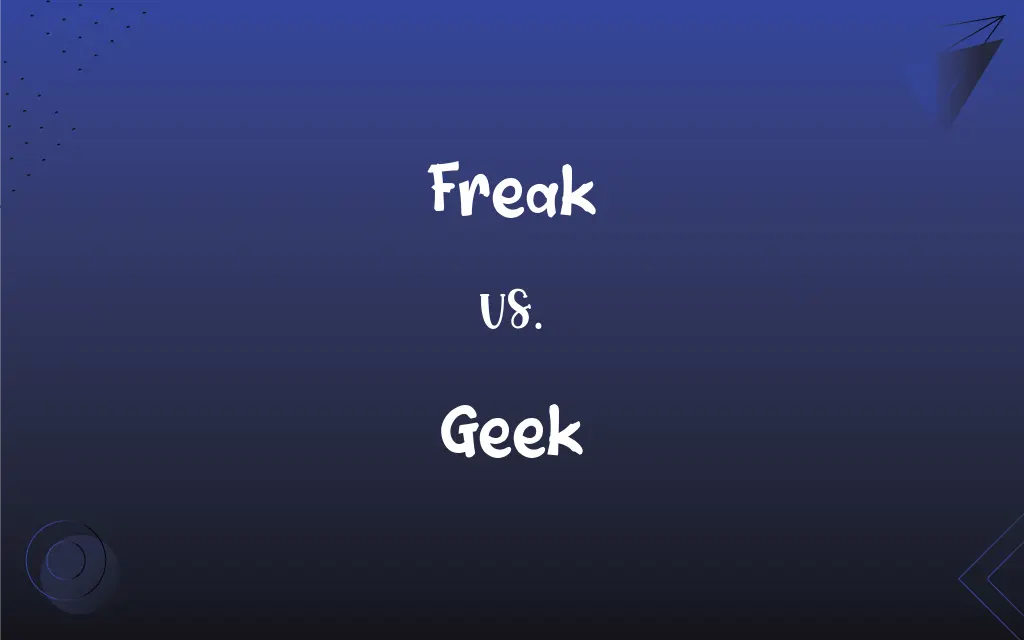Freak vs. Geek: What's the Difference?
Edited by Janet White || By Harlon Moss || Updated on November 8, 2023
"Freak" often refers to a very unusual or unexpected phenomenon, while "geek" describes someone passionate about a niche or intellectual hobby.

Key Differences
A "freak" can denote an anomaly or something that deviates from the norm, such as a "freak of nature" or a "freak accident." On the other hand, a "geek" typically refers to a person who is deeply knowledgeable and enthusiastic about a specialized subject, often in technology or fandoms.
The term "freak" sometimes carries a negative connotation, implying something or someone is bizarre or abnormal, as in "control freak." Conversely, "geek" has evolved to have a more positive connotation, often suggesting expertise and dedication, such as in "computer geek."
Historically, "freak" has been used to label people with extraordinary physical conditions, especially in sideshow entertainments. "Geek," however, has become associated with individuals who have intense interests in specific areas, like science fiction, gaming, or comics.
In popular culture, "geeks" are often portrayed as intelligent, if somewhat socially awkward, individuals with a penchant for detail and trivia. "Freaks," however, are sometimes depicted as characters who challenge societal norms or possess unconventional characteristics.
While "geek" can be a badge of honor in certain communities, celebrating deep intellectual or pop-cultural interests, "freak" may still be used to stigmatize or ostracize individuals or situations that are seen as odd or extreme.
ADVERTISEMENT
Comparison Chart
Connotation
Often negative, implying abnormality.
Generally positive, implying expertise.
Subject Focus
Can refer to people, events, or phenomena.
Usually refers to a person with niche interests.
Cultural Perception
Historically linked to sideshow oddities.
Associated with intelligence and passion.
Social Implication
May imply deviance from social norms.
Suggests a deep, possibly obsessive, hobbyist.
Evolution of Meaning
Remains more static, with consistent connotation.
Has shifted from derogatory to more celebratory.
ADVERTISEMENT
Freak and Geek Definitions
Freak
A very unusual and unexpected event or situation.
The storm was a freak occurrence for this time of year.
Geek
Someone who is socially awkward or unpopular.
The film portrays him as a geek who eventually becomes the hero.
Freak
A person with an obsessive interest in a particular activity.
He's a fitness freak who works out twice a day.
Geek
A person with an eccentric devotion to a particular interest.
A board game geek, he owns over 300 games.
Freak
Someone who behaves wildly and uncontrollably.
She became a freak on the dance floor.
Geek
A person who is fascinated with and knowledgeable about pop culture.
She's a true film geek who goes to every festival.
Freak
An abnormal or irregular phenomenon.
The biologist studied the freak mutation in the lab.
Geek
An enthusiast or expert especially in a technological field or activity.
She's a computer geek who can code in multiple languages.
Freak
An unconventional person; an oddity.
He was considered the class freak due to his eccentric habits.
Geek
A knowledgeable and obsessive enthusiast.
As a history geek, he loves reenacting battles.
Freak
A thing or occurrence that is markedly unusual or irregular
A freak of nature produced the midsummer snow.
Geek
A person regarded as foolish, inept, or clumsy.
Geek
A person who is single-minded or accomplished in scientific or technical pursuits but is felt to be socially inept.
FAQs
Are geeks always interested in technology?
No, geeks can have a wide range of interests, not limited to technology.
Can "freak" refer to an enthusiast?
Yes, in contexts like "fitness freak" or "clean freak", it refers to someone with an intense interest.
Is "freak" always used negatively?
Often, but not always; it can also indicate enthusiasm, as in "health freak".
Is "freak" used in formal contexts?
It's typically more informal and can be seen as derogatory in formal settings.
Are all geeks introverted?
Not necessarily; while some are, others are quite social within their interest groups.
Is it offensive to call someone a freak?
It can be, depending on context and intent.
Are geeks typically educated?
Geeks are often self-educated in their areas of interest, though not exclusively.
Is "freak" associated with physical traits?
Historically, yes, but its usage has broadened.
Do geeks participate in fandoms?
Many do, engaging deeply with their favorite media.
Can "freak" be empowering?
Some people embrace the term to celebrate uniqueness.
Can "geek" refer to a profession?
While not a professional title, "geek" can denote someone's expertise in professional contexts.
Is "freak" a modern term?
It's been in use for centuries, with its meaning evolving over time.
Is being a geek fashionable?
In many circles, geek culture is celebrated and considered trendy.
Does "geek" imply social awkwardness?
It can, though the stereotype is lessening as geek culture becomes mainstream.
Can "freak" have a positive connotation in sports?
Yes, as in "freak athlete", it can denote exceptional ability.
Does "freak" appear in academic writing?
It's rare and would typically appear in discussions of cultural phenomena or in quotations.
Is "geek" a term of endearment?
In certain communities, it's used positively to denote passion.
Do geeks have specialized knowledge?
Typically, geeks are very knowledgeable in their areas of interest.
Are geeks well-represented in media?
Yes, geek culture has a significant presence in films, TV, and literature.
Can "freak" indicate a temporary state?
Yes, such as in "freak out", meaning a sudden state of excitement or anger.
About Author
Written by
Harlon MossHarlon is a seasoned quality moderator and accomplished content writer for Difference Wiki. An alumnus of the prestigious University of California, he earned his degree in Computer Science. Leveraging his academic background, Harlon brings a meticulous and informed perspective to his work, ensuring content accuracy and excellence.
Edited by
Janet WhiteJanet White has been an esteemed writer and blogger for Difference Wiki. Holding a Master's degree in Science and Medical Journalism from the prestigious Boston University, she has consistently demonstrated her expertise and passion for her field. When she's not immersed in her work, Janet relishes her time exercising, delving into a good book, and cherishing moments with friends and family.































































